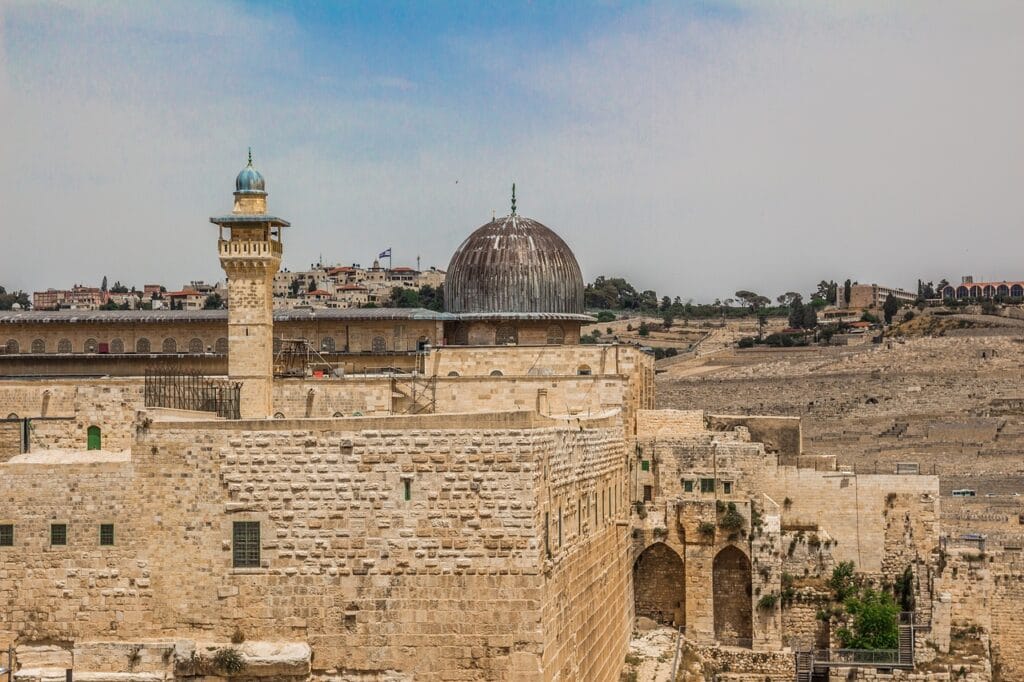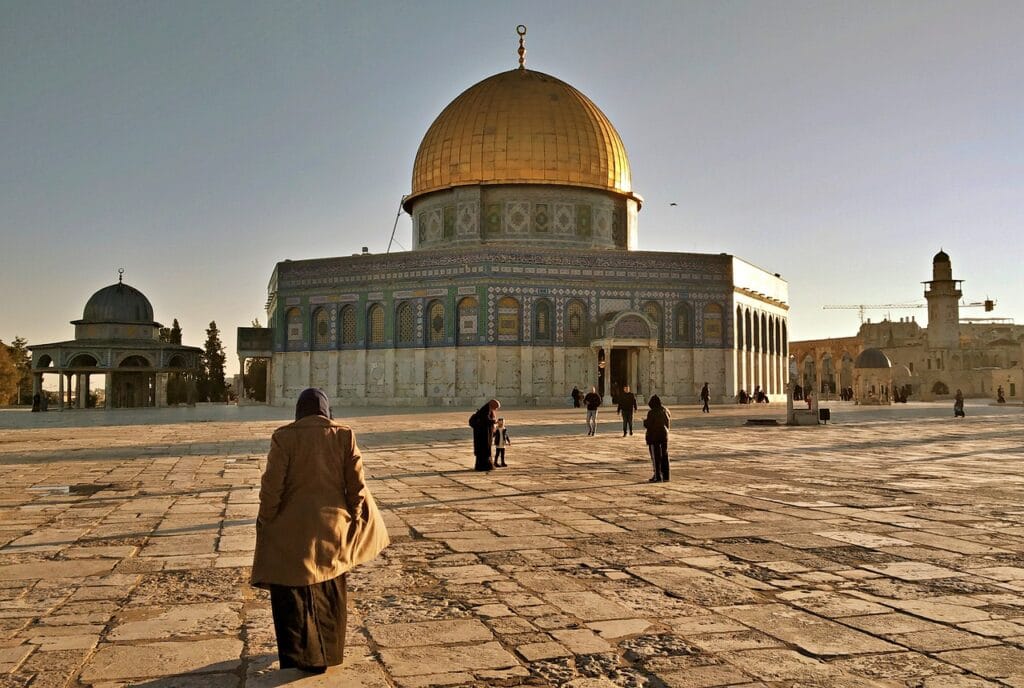Introduction
situated in the heart of Jerusalem, Masjid Al-Aqsa holds a position of profound reverence in Islamic history and global civilization. Located within the sacred compound known as Al-Haram Al-Sharif, this site is deeply interwoven with spirituality, history, and identity. Its golden Dome of the Rock and silver-domed prayer hall symbolize the grandeur of Islamic architecture, while the surrounding courtyards tell stories of faith, resilience, and devotion.
For Muslims worldwide, it is a landmark of divine connection, representing both earthly and heavenly realms. But how did this site achieve such significance? To understand its legacy, we must explore its deep-rooted history, spanning centuries of faith, conquest, and preservation.

Historical Background
Pre-Islamic History
Masjid Al-Aqsa’s origins predate Islam, with ties to ancient texts and traditions. Its location is often associated with Mount Moriah, mentioned in Judeo-Christian scriptures as the site where Prophet Ibrahim (Abraham) prepared to sacrifice his son. This sacred ground, revered by the three Abrahamic religions, has long been a center of worship and reflection.
For centuries, Jerusalem attracted pilgrims seeking divine blessings. Before Islam, this area housed structures that were considered sacred by the Jewish community. The Romans and later the Byzantines also left their mark, shaping the site’s pre-Islamic identity.
Role During the Prophet’s Night Journey
One of Masjid Al-Aqsa’s most defining moments came during Al-Isra and Miraj, the miraculous night journey of Prophet Muhammad (PBUH). In this event, recorded in the Quran, the Prophet traveled from Masjid Al-Haram in Makkah to Masjid Al-Aqsa, where he led all prophets in prayer. From here, he ascended to the heavens.
This event firmly established Masjid Al-Aqsa as the second holiest site in Islam after Makkah and Madinah. It was also the first Qibla for Muslims, emphasizing its central role in Islamic rituals and identity.
The Era of Islamic Caliphates
Under the Rashidun Caliphate
The Islamic connection to Jerusalem deepened during the reign of Umar ibn al-Khattab, the second caliph of Islam. After the peaceful conquest of Jerusalem in 637 CE, Umar personally traveled to the city to accept its surrender. Upon arriving at the site, he recognized its sanctity and laid the foundation for its transformation into a place of Muslim worship.
A humble wooden structure was erected on the site, symbolizing Islam’s respect for simplicity and devotion.
Umayyad Contributions
Under the Umayyad Caliphate, the site was further developed into a magnificent religious complex. Caliph Abd al-Malik commissioned the construction of the Dome of the Rock, an architectural masterpiece that remains one of the most iconic symbols of Islamic art. His successor, Al-Walid I, expanded the prayer hall of Masjid Al-Aqsa, creating a unified space of worship and reflection.
The Umayyads emphasized not only the spiritual but also the cultural importance of the site, ensuring its beauty resonated with all visitors.
Abbasid and Fatimid Rule
The Abbasids and Fatimids prioritized the preservation of Masjid Al-Aqsa. Despite facing natural disasters like earthquakes, they invested in repairs and enhancements. Their commitment demonstrated the unwavering dedication of Muslim rulers to maintain this sacred site.
Masjid Al-Aqsa During the Crusades
Christian Control
In 1099, the Crusaders seized Jerusalem, converting Masjid Al-Aqsa into administrative headquarters and stables. The sacredness of the site was overshadowed by its militarization, marking a dark chapter in its history.
Return to Islamic Control
In 1187, Salahuddin Ayyubi, the great Muslim leader, recaptured Jerusalem. His actions restored the sanctity of Masjid Al-Aqsa, cleansing and rededicating it for Islamic worship. This triumph reinforced its status as a symbol of Muslim resilience and unity.
Later Islamic Periods
Mamluk and Ottoman Eras
During the Mamluk and Ottoman periods, Masjid Al-Aqsa underwent extensive renovations. The Ottomans, in particular, adorned the site with intricate designs and maintained its infrastructure. This era saw Jerusalem flourish as a center of learning and spirituality.
Religious Importance of Masjid Al-Aqsa

Significance in Islam
Masjid Al-Aqsa is frequently referenced in Islamic texts. It is described as one of the three holiest places to which Muslims are encouraged to travel. Prayers offered here are believed to yield immense rewards, reinforcing its role as a beacon of spirituality.
Role in Other Abrahamic Religions
While its significance in Islam is unparalleled, Masjid Al-Aqsa also holds meaning for Christians and Jews. Its shared reverence highlights the interconnectedness of Abrahamic faiths, making it a unique symbol of spiritual unity.
Modern History and Current Status
20th Century Changes
The 20th century saw Masjid Al-Aqsa face numerous challenges, including political disputes and conflicts. The establishment of Israel in 1948 and subsequent wars impacted access to the site, creating a contentious and volatile environment.
Current Administration
Today, Jordan’s Waqf oversees the management of Masjid Al-Aqsa. Despite facing obstacles, efforts to preserve and protect its sanctity continue. However, tensions persist, with the site often at the center of political and social struggles.
Cultural and Political Challenges
Masjid Al-Aqsa Today
The present-day challenges include restricted access for worshippers, threats to its structural integrity, and political disputes. Despite these hurdles, it remains a symbol of steadfast faith and resistance.
Preservation Efforts
Local and international organizations work tirelessly to preserve Masjid Al-Aqsa’s legacy. These efforts emphasize the importance of safeguarding its historical and spiritual significance for future generations.
Conclusion
Masjid Al-Aqsa is more than a historical landmark—it is a living testament to faith, resilience, and unity. Its story reflects the highs and lows of human civilization, reminding us of our shared heritage and responsibility to protect such treasures.
FAQs
- What is the historical origin of Masjid Al-Aqsa?
Its origins date back to ancient times, with ties to Abrahamic prophets and sacred traditions. - Why is Masjid Al-Aqsa central to Islamic belief?
It is revered as the location of the Prophet Muhammad’s night journey and the first Qibla in Islam. - Who oversees Masjid Al-Aqsa today?
The Jordanian Waqf is responsible for its management and preservation. - How has Masjid Al-Aqsa been affected by conflicts?
It has faced restricted access, structural threats, and political disputes over centuries. - What efforts are being made to protect Masjid Al-Aqsa?
Preservation initiatives by local and global organizations aim to safeguard its legacy.


Understanding health disparities highlights inequalities within populations. Learning about social determinants of health explains differing outcomes. Recognizing how factors like race, income, and location impact health is crucial. Awareness of how access to medical preparations varies across groups is relevant. Knowing about efforts to achieve health equity raises awareness. Finding information that sheds light on health disparities is important. The iMedix podcast discusses broader societal impacts on health. It serves as a public health-oriented podcast promoting equity awareness. Tune into the iMedix health news podcast for related stories. iMedix: podcast content that connects health to society.
This website, you can find a wide selection of online slots from top providers.
Players can try out traditional machines as well as new-generation slots with high-quality visuals and interactive gameplay.
Even if you’re new or a seasoned gamer, there’s something for everyone.
casino
All slot machines are ready to play round the clock and compatible with desktop computers and smartphones alike.
You don’t need to install anything, so you can get started without hassle.
Platform layout is intuitive, making it convenient to browse the collection.
Register now, and enjoy the world of online slots!
Our platform offers a wide range of pharmaceuticals for ordering online.
Customers are able to quickly order needed prescriptions from anywhere.
Our inventory includes both common solutions and more specific prescriptions.
All products is sourced from licensed suppliers.
https://www.rosewood.edu.na/profile/imedix/profile
We prioritize quality and care, with encrypted transactions and on-time dispatch.
Whether you’re treating a cold, you’ll find affordable choices here.
Explore our selection today and experience stress-free online pharmacy service.
This website features various medical products for home delivery.
Anyone can conveniently get treatments without leaving home.
Our range includes popular solutions and targeted therapies.
All products is acquired via reliable pharmacies.
vidalista 40 mg reviews
Our focus is on discreet service, with encrypted transactions and fast shipping.
Whether you’re managing a chronic condition, you’ll find what you need here.
Begin shopping today and experience convenient support.